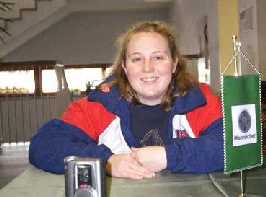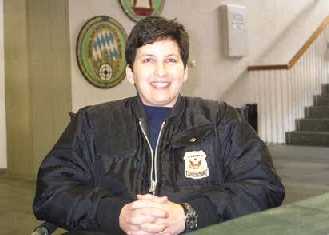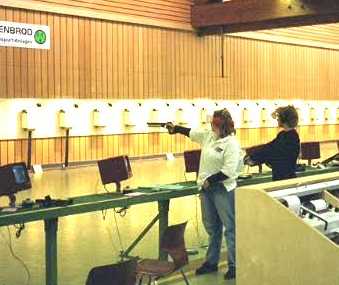INTERVIEW WITH BEKI SNYDER AND RHONDA BRIGHT
Beki Snyder is a former Olympic Training Centre resident athlete, 1996 Olympic Team member, and winner of the 1998 World Cup in Sydney. Rhonda Bright is a former Army Marksmanship Unit member, and multiple-times national champion in Air Pistol.
How did you start out shooting Beki?
My dad shot three gun.
Did you start out shooting three gun?
No, just air rifle at first, then later air pistol. But my dad was a big three gun shooter.
What about you, Rhonda?
I started out with rifle.
When did you switch over to pistol?
After I got to the unit in about 1992.
They recruited you as a rifle shooter?
Yes, I shot rifle at the unit for four years and then switched over.
What made you decide to switch?
Less stuff to carry (laughs). No, it seemed like I was more competitive in a shorter period of time.
Who was your greatest influence on your shooting?
My Dad.
My Dad.
What’s your most valuable practice drill?
Dry firing on the wall, but not dry firing each time. Putting it up and holding the gun up there and bringing the trigger back.
Not actually releasing it, you’re just pulling the weight on the trigger? Do you hold on a dot or do you just hold on the blank wall?
I don’t hold on a dot, just hold. I do hold on a dot, but what she said is was probably the most important thing. But I also do the dry fire on the wall.
How do you handle the mental game during the match?
Poorly (laughs), something I’m working on at this point in time. Today I just kept telling myself, “I’m not going to be last, I’m not going to be last”. I just try and do the same each shot.
 You think the same thing, I mean you loading it and everything, you just go through a mental routine or what?
You think the same thing, I mean you loading it and everything, you just go through a mental routine or what?
I try and have a mental saying or phrase or something that I say for each shot.
I sing.
You sing, any certain song?
Slow ride, I don’t know the name of it, Take it easy.
You do that in between every shot or?
Yes, sometimes I use that song, sometimes I use different songs, but that’s my most popular.
How do you know when to sit down or step back and take a break during a shot and re-focus?
During a shot or during the match?
Well, both. Answer both questions.
I don’t ever get to take a break during the match.
You don’t ever take a break, you shoot all 40 shots?
I don’t ever have time to. I’ll put the gun down and I’ll like bend my knees and shake my arms out but I don’t ever have time to sit down. And to break the shot whenever I get the first inkling that something is not right about it I put it down.
What about you, Rhonda?
Usually you know pretty soon if things aren’t right with the shot, you can put it down right away. As far as sitting down during the match, if things aren’t going well and you just can’t seem to fix it then you sit down.
With your routine, Beki, you pretty well take up the entire amount of time just shooting and it seems to work?
Sometimes… I’d say about 75% of the time.
What do you think about during a match, sing a song basically?
I sing… Yes, I just try to keep the same, I try not to think like chemistry or nothing too deep, just try to keep the same routine shot after shot.
Do you prepare for a match at the beginning of the season different than you do later on in the competition season, like before Nationals or if we’ve got the Olympic selections coming on?
I try to keep my training consistent through the whole thing because if you have a big match like Nationals coming up and you’re like, “I have to train differently because this is Nationals”, then you’re just adding pressure on yourself and you’re probably changing things that don’t need to be changed. You just stick with what you know works. If it’s not working for you, now by all means change, but don’t make a change because this is Nationals. You train for every match like every match is Nationals.
I think in the beginning of the year, more quantity, and using my match specs to check certain things, whereas toward the middle of the year there might be less quantity and more quality and just using all things that you learned in the beginning of the year.
Do you train with weighs in the winter months for strength and stability or do you just dry fire a lot?
No. Neither, I don’t lift, I take a month off, but I really don’t do any of that stuff.
Cardiovascular training?
Can’t hurt, I don’t do it. Right, one of these days I’m going to get right on top of it but it can’t hurt, but I don’t do it.
I don’t do it very much because I get headaches when I do so it’s kind of hard on me. But I think it’s a good idea.
What one thing do you wish you could have learned earlier in your shooting career?
I had it pretty good, I can’t complain. I’ve experienced some pretty impressive success early on, so I can’t say there was anything I should have learned earlier. I feel pretty right on schedule. I can’t think of anything, I always had good coaching.
How do you go about selecting, or how do you select the front sight in relation to the bull and do you do a lot of changes to rear sight width? You know, when you go to a new range or a new match?
My front sight is about the same width as the bull. I have a good amount of light in between the rear sight and the front sight. I think it’s easier on your eye to have a little bit of light there instead of as narrow as you can make it.
I don’t know, I don’t usually mess with anything. Shooting the way I got it from the factory, I just do it that way.
What’s your funniest shooting experience?
It was the first year I shot the Munich World Cup. I was shooting like pretty good for myself but I was really feeling different somehow, and then I realized my bra was undone. I was like, “Maybe I should do this every time”.
This was in the middle of the match you discovered this?
Yes, this was in the middle of the match.
Do you have an embarrassing time Rhonda, or anything funny  happened?
happened?
No, just embarrassing shooting like I shot today.
Hey, I shot that like that two days ago!
I shot Junior Olympics with my barrel loose one time. I didn’t realize it until two days later when I was dry firing and “chink chink”, and there it was loose.
How do you all feel about trigger weights? Do you both keep yours pretty much close to the limit?
Yes, with a little bit of fudge factor. It’s not right on five hundred, it’s a little bit over.
Mine’s a little bit heavy.
Since both of you all started as juniors and came up through junior programs and are not that far removed from it, what would you tell someone starting out in pistol shooting? What would you tell them to focus on?
Having fun. Especially as a junior it’s the only way you’re gonna stay with it. I think you’ve got to enjoy it and then you can work your technique, and work your way up through the ranks.
As long as you can see the front sight, pull the trigger.
I started with one of those really ancient FWBs that popped on the side (Model 65) but I think one thing people try too early, is (that) they try to get little kids shooting pistol and they just don’t have the body strength to do it. That’s why I started with rifle and switched to pistol and I learned so much just with trigger control and everything and it really helped. And then you move to pistol when you have the upper body strength to hold it up.
